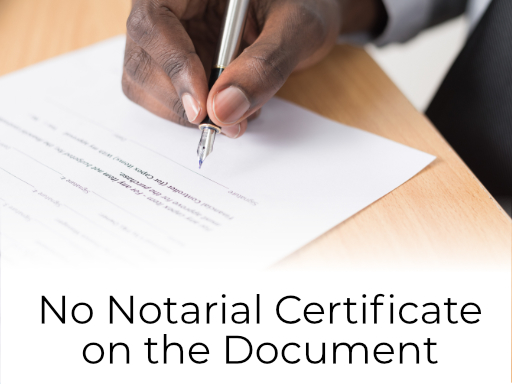Notary Public Underwriters Blog
No Notarial Certificate on the Document
- Details
- Published: April 19, 2021

It happens eventually to every notary… a person appears for a notarization, but the document is presented without any notarial certificate language indicating the notarial act to be performed.
Some inexperienced notaries wonder why this matters. They think a sensible solution is to use and attach the separate notarial certificate form that appears to best match the document content. In fact, many customers expect this because they perceive notaries to be “document experts.”
Veteran notaries, however, know that a notary never selects the notarial act to be performed. It is not the notary’s role to decide how a document should be executed*; it is to perform the indicated or chosen notarial act and accurately record the facts of the notarial act in the notary’s record book or journal (required in many states, recommended everywhere else).
When the document lacks notarial certificate language indicating the notarial act to be performed, it must be chosen by the document signer, or a party relying on the executed document, or an attorney.
Recommended procedure: The notary should always be prepared with printed notarial certificate forms for the specific notarial acts authorized by the notary’s commissioning state. The notary will show each certificate to the document signer, and describe each related notarial act in the simplest possible terms, for example:
- “This language is for an acknowledgment. For this act, you would acknowledge to me that you signed the document of your own free will, with understanding of its contents and the effect of you signing it.”
—or— -
“This language is for an oath/affirmation.* For this act, you would swear or affirm under penalty of perjury that the contents of this document are true.”
—or (only in states that authorize their Notaries to perform this act)–
“This language is for a signature witnessing. You will simply sign the document in my presence.”
_______________
*Remember that oaths and affirmations have the same legal effect. A person swearing an oath invokes a supreme being: “I solemnly swear under penalty of perjury that the contents of this document are true, so help me God.” A person making an affirmation prefers to be bound by his or her own conscience, with no reference to a supreme being: “I affirm under penalty of perjury that the contents of this document are true.”Once the document signer makes his or her/their choice, the notary will perform the chosen notarial act, complete the appropriate certificate form, and securely attach the certificate form to the signed document.
When using a separate certificate form, the notary must always ensure that the certificate form language substantially conforms to the requirements of his or her/their notary law or administrative rules. Of particular concern is any additional statement or information required by statute, for example whether the signer’s personal appearance was by physical presence, or by means of audio-visual communications technology (in states authorizing remote online notarization). Any missing but required language must be added by the notary.
As a best practice (required in some states) the notary should write, in the top or bottom margin of the certificate, something descriptive about the notarized document to which the certificate is attached. For example, “This certificate is attached to a (___) page document titled (_____) and signed on (_____).” This helps deter the certificate’s removal and attachment to a different document. Many separate certificate forms available for purchase provide this statement with the appropriate blanks.
One last note: these same procedures may also be used when the document presented for notarization contains certificate language, but it indicates a notarial act that is not authorized in the notary’s commissioning state.
